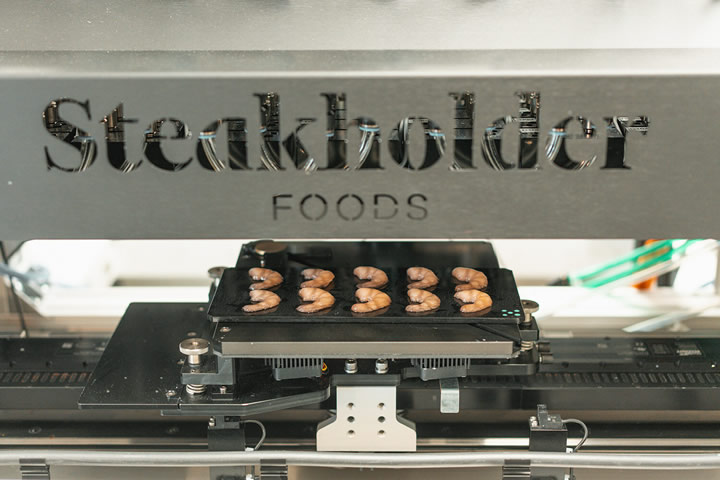Steakholder Foods Adds Plant-Based Shrimps to Expanding Range of 3D-Printed Seafood and Analogues

Steakholder Foods Ltd. (Nasdaq: STKH), a leader in cultivated meat and 3D bioprinting technology, is excited to announce that it has further expanded its 3D-printing capabilities with the world's first plant-based, 3D-printed shrimps, expertly designed to mimic the authentic texture and flavor of conventional shrimps. The shrimps were precision-printed on Steakholder Foods' proprietary DropJet printer, designed for fish and seafood printing, using shrimp-flavored ink developed by Steakholder Foods' food technology team. It is the latest addition to the Company's portfolio of printed seafood products to be offered to potential customers, on a plant (analogue) or potentially hybrid (combination plant and cultivated) basis, as economies of scale develop to enable price-competitive cell development.
The shrimp market is worth more than USD 60 billion, and is projected to continue growing substantially over the coming decade. With 7.6 million tons of shrimp harvested in 2023, Steakholder Foods' heavy-duty production printing solution aims to provide partners and customers with the means to meet growing demand through high-volume, efficient, and sustainable production, offering a practical and environmentally-friendly alternative to traditional shrimp farming.
Arik Kaufman, CEO of Steakholder Foods, said: "By unveiling a second new species of plant-based, 3D-printed seafood this month, we expect to position Steakholder Foods to sell and deliver its first DropJet printer in 2024, offering partners and customers a unique opportunity to benefit from the expanding global seafood market, while making the right kind of impact on the environment."
About Steakholder Foods
Steakholder Foods Ltd. is an international deep-tech food company at the forefront of the cultured meat revolution. The company-initiated activities in 2019 and is listed on the Nasdaq Capital Market under the ticker "STKH", with headquarters in Rehovot, Israel.
The company is developing a slaughter-free solution for producing cellular agriculture meat products, such as beef and seafood, by offering manufacturers the ability to produce a cultivated meat product that aims to closely mimic the taste, texture, and appearance of traditional meat— as an alternative to industrialized farming and fishing. With its membership in the UN Global Compact, Steakholder Foods is committed to act in support of issues embodied in the United Nations Sustainable Development Goals (SDGs) which include strengthening food security, decreasing carbon footprint, and conserving water and land resources.
For more information, please visit: https://steakholderfoods.com
Comments (0)
This post does not have any comments. Be the first to leave a comment below.
Featured Product

